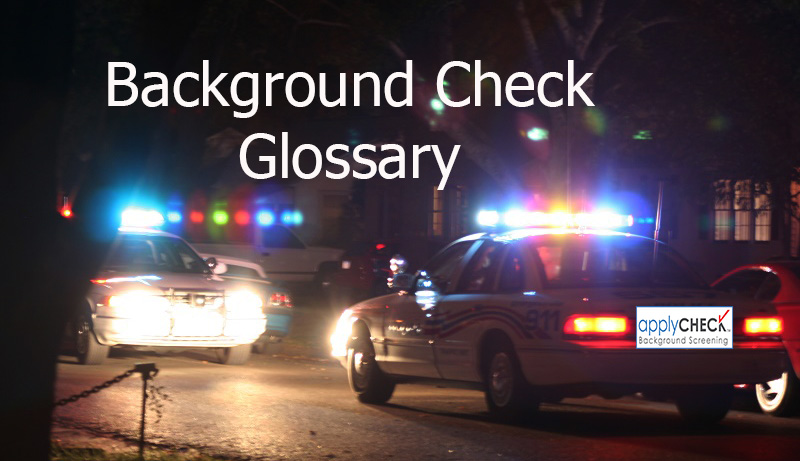Background Check Glossary
The background check industry is filled with technical terms that may appear on criminal searches within a background check for tenant screening. In order to help our customers understand phrases that may be confusing on a tenant screening report, we have compiled a glossary of legal terms designed to make reading and understanding a report from Applycheck as easy as possible.
Acquittal. The legal and formal certification of the innocence of a person who
has been charged with crime; a deliverance or setting free a person from a
charge of guilt; finding of not guilty.
Arraignment. Procedure whereby the accused is brought before the court to
plead to the criminal charge against him in the indictment or information.
Capias. The general name for several species of writs, common characteristic
of which is that they require the officer to take a named defendant into custody.
Conviction. The result of a criminal trial which ends in a judgment or sentence
that the accused is guilty as charged.
Criminal complaint. In criminal law, a charge, preferred before a magistrate
having jurisdiction, that a person named, has committed a specific offense, with
an offer to prove the fact, to the end that a prosecution may be instituted.
Criminal plea. The defendant’s response to a criminal charge (guilty, not guilty,
or nolo contendere).
Defendant. The party against whom relief or recovery is sought or the accused
in a criminal case.
Discovery. The pre-trial devices that can be used by one party to obtain facts
and information about the case from the other party in order to assist the party’s
preparation for trial.
Dismissal. An order of judgment finally disposing of an action, suit, motion,
etc., without trial of the issues involved.
Dismissal without prejudice. Term meaning dismissal without prejudice to the
right of the complainant to sue again on the same cause of action.
Dismissal with prejudice. Term meaning an adjudication on the merits, and
final disposition, barring the right to bring or maintain an action on the same claim
or cause.
Evidence. Any species of proof, or probative matter, legally presented at the
trial of an issue, by the act of the parties and through the medium of witnesses,
records, documents, exhibits, concrete objects, for the purpose of inducing belief
in the minds of the court or jury as to their contention.
Expungement of record. Process by which record of criminal conviction is
destroyed or sealed after expiration of time.
Felony. A crime of a graver or more serious nature than those designated as
misdemeanors.
Grading of crime. Higher or lower in grade or degree, according to the
measure of punishment attached and meted out on conviction and the
consequences resulting to the party convicted, for example first, second, or third
degree murder.
Grand jury. Body of citizens, the number of whom varied from state to state,
whose duties consist in determining whether probable cause exists that a crime
has been committed and whether an indictment should be returned against one
for such a crime.
Indictment. A formal written accusation originating with a prosecutor and
issued by a grand jury against a party charged with a crime. An indictment is
referred to as a “true bill”, whereas failure to indict is called a “no bill”.
Information. An accusation exhibited against a person for some criminal
offense, without an indictment. A written accusation made by a public prosecutor,
without the intervention of a grand jury.
Judgment of conviction. A judgment conviction shall set forth the plea, the
verdict or findings, and the adjudication and sentence.
Magistrate. An inferior judicial officer, such as a justice of the peace.
Misdemeanor. Offenses lower than felonies and generally those punishable by
fine, penalty, forfeiture or imprisonment otherwise than in penitentiary.
Nolle prosequi. A formal entry upon the record by the prosecuting attorney in a
criminal action, by which he declares that he will no further prosecute the case,
either as to some of the defendants or altogether.
Nolo contendere. A plea in a criminal case which has similar legal effect as
pleading guilty. Type of plea which may be entered with leave of court to a
criminal complaint or indictment by which the defendant does not admit or deny
the charges
Parole. Release from jail, prison, or other confinement after actually serving
part of sentence. Conditional release from imprisonment which entitles parolee to
serve remainder of term outside confines of an institution.
Plaintiff. A person who brings an action. A person who seeks remedial relief for
an injury of rights; it designates a complainant.
Prosecute. To proceed against a person criminally.
Quash. To vacate or make void as in to quash an indictment.
Summons. In criminal law, a written order notifying an individual that he or she
has been charged with an offense directing the person to appear in court to
answer the charge.
Suspended sentence. In criminal law, a suspended sentence means in effect
that the defendant is not required at the time sentence is imposed to serve the
sentence.
Warrant for arrest. A written order of the court which is made on behalf of the
state or United States and is based upon a complaint issued pursuant to statute
and/or court rule and which commands law enforcement to arrest a person and
bring them before court.
>
